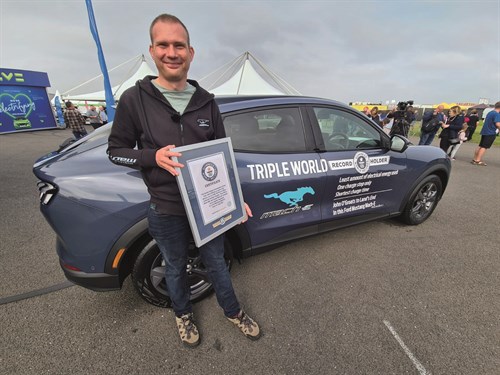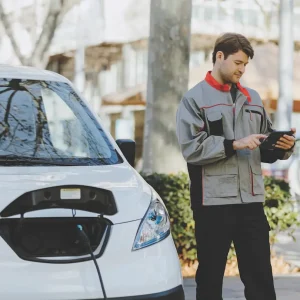Mitie is among the UK’s largest utility companies, with services spanning engineering, cleaning and security, to landscaping, decarbonisation projects and waste reduction.
Around 70% of its permanent fleet is comprised of commercial vehicles, the bulk of them vans. Small and medium units – think Renault Kangoo/Peugeot Partner and Ford Transit Custom/Vauxhall Vivaro – account for about 80% of its LCVs, while the remaining 20% is specialist gear, such as 4x4s, tippers and dropsides. Tractors and gritters make up some of the heavier equipment.
Mitie took on its first electric vehicle in May 2019 and a further 2,700 EVs have since joined the fleet – making up 38% of the total, resulting in one of the largest EV fleets in the UK. It plans to have its full fleet on electric power by 2025.
In 2022 Mitie targeted taking on 150 electric vans every month until December.
Mitie has installed 3,000 charging points at residential and commercial sites and made it mandatory for new offices to have chargers in half of their parking bays. The company runs an ‘electric first’ policy with leasing contracts reviewed quarterly to ensure the fleet is transitioning to the most efficient EVs. Alongside this, Mitie has introduced comprehensive training for drivers using EVs and also on economical driving no matter what the powertrain is.
Mitie’s Driver Risk Management Framework (DRMF) uses telematics to analyse each vehicle’s data and drivers’ behaviour, which is then addressed by line managers if necessary. This improves driver behaviour, offers training where appropriate, and encourages fuel-efficient driving. eLearning modules have been created to support any interventions required. Mitie’s Technical Service Operation Centre (TSOC) enables tasks to be completed remotely, reducing miles travelled and all vehicles have speed limiters installed to reduce fuel consumption and emissions.
The company is planning to launch a service through its travel management provider, TMC, to enable direct payment for home charging. This will help Mitie to encourage its drivers to charge at greener times, as well as nudging households to move to green tariffs.
Mitie’s Plan Zero Consultancy offers a comprehensive EV transition service comprising strategies to boost business resilience, reach net-zero targets, improve the environment, attract new talent and increase employee satisfaction. It also includes a fully electric approach for new mobilisations.
Mitie’s first stop in deploying EVs is identifying employees that can easily adopt them – understanding who can have home charge points installed and prioritising them to switch.
One of the trickier aspects of electrifying a fleet such as Mitie’s is the unpredictability of what and where the vehicles will be doing and going. This is more difficult for companies with reactive operations than for those which deviate little from their set routes. The challenge for major fleets like Centrica, Mitie and BT Openreach is that they don’t follow planned delivery routes with an exact mileage each day. Even with a day’s work planned, there will be reactive jobs that come in or clients’ requirements change or an urgent breakdown happens. EVs need higher range to handle that, which is a particular problem for larger vans, which need to accommodate sufficient load space and payload. Mitie moved to resolve this issue when it added a Vauxhall Vivaro-e to its fleet in April – one of an order of more than 600. It believes the combination of the Vivaro’s longer range and lightweight fittings in the load bay could offer a viable alternative to its larger diesel vans.
Highly Commended: Brecon Beacons National Park Authority

Fleet manager Kevin Booker has electrified the park authority’s whole pool fleet. All of its vehicles are now either plug-in hybrids (two 4WD vehicles) or fully electric. The Brecon Beacons National Park was set up in 1957 and covers 519 square miles of uplands and mountainous terrain in South Wales.
The environment is of high importance to the authority and was the main push for its plans to go green. As early adopters of electric vehicles, the authority is so far down the road to electric vehicles that the 2030 ICE ban isn’t a concern. The authority’s use of electric vehicles has led it to become one of only two Go Ultra organisations in Wales, running the highest number of electric vehicles out of all UK National Parks. The fleet consists of 25 vehicles in total including cars and vans. It added its first electric pool vehicles in 2016.


